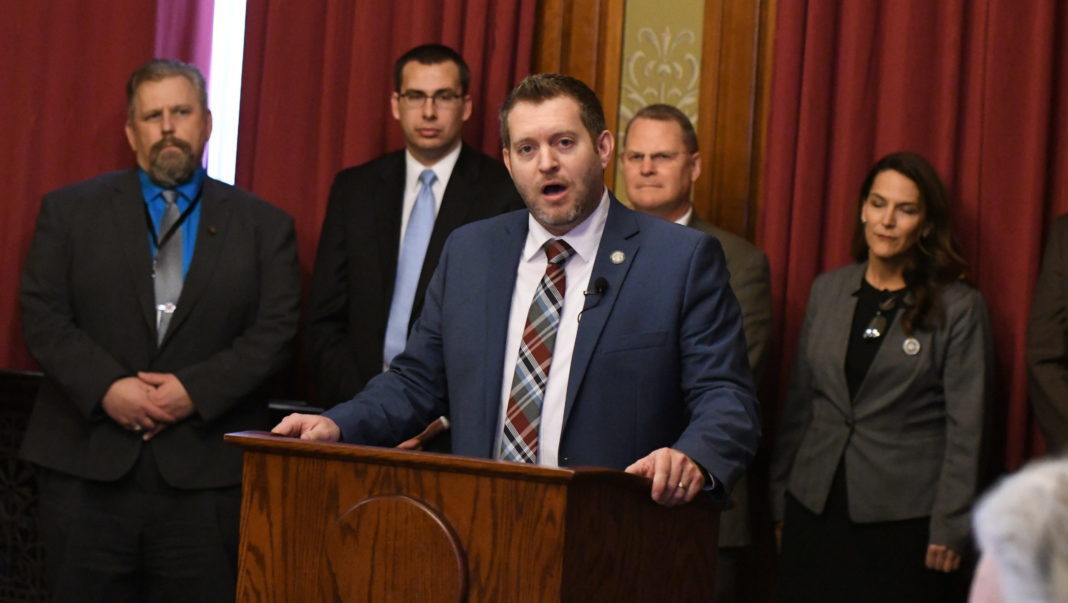Republican State Senators Jason Schultz and Jake Chapman signed a bill out of subcommittee on Wednesday morning that addresses Big Tech censorship of Iowans.
The bill would revoke any tax credits for the free-speech stifling Big Tech companies that choose to shut down the thoughts and opinions of Iowans.
“My feeling is we have an obligation as legislators under our Constitution to protect Iowans under Section 7 — ‘every person may speak, write and publish his sentiments on all subjects being responsible for the abuse of that right. No law shall be passed to restrain or abridge the liberty of speech or of the press,” Chapman said. “We have an obligation to protect Iowans.
“I respect that these are private companies, but they are the public square of the 21st century. I think it’s a very dangerous road Big Tech is going down.”
Chapman said the bill is present in the legislature because the First Amendment is “under attack as never before.”
“And what we have seen from some of these big tech companies, who frankly are receiving hundreds of millions of dollars in local, state tax breaks and exemptions,” he said. “They have an obligation to make sure that Iowans are being safeguarded with their ability to say what they want to say, so long as they’re not violating criminal law. And it’s really unfortunate that we are here today because of several acrots that I believe are using a coordinated effort to silence the voice of Iowans.”
Nearly everyone who spoke during the subcommittee opposed the legislation or said they were neutral.
Dean O’Connor, the mayor of Altoona, said the relationship that his city and Facebook have forged is “a really good relationship.”
Carl Szabo, vice president and general counsel at Net Choice and board member of ALEC, spoke against the bill.
“I’m worried about the silencing of conservative voices as well,” he said. “I mean, I’m a conservative. But unfortunately, this is not the right approach. What we are seeing right now is something that is essentially upending our conservative principles of limited government and free enterprise.”
Szabo expressed concern that there would be “really mean things that we probably don’t want to see when we go on a social network.”
He also said it is a direct interference with private contracts. Finally, Szabo said forcing private businesses to host content they do not think is best for their users is “not the right approach” and that it violates “every notion we have when we support the rights of private businesses to decide what’s best for them.”
Tyler Diers, the midwest executive director for TechNet, spoke against the bill.
“This bill perversely creates an incentive for companies to not prohibit and remove any objectionable content in order to keep tax incentives for projects that are providing jobs such as that in Altoona and economic development elsewhere in the state,” Diers said.
Diers actually said that companies take the responsibility seriously in removing harmful content “in an unbiased manner while still keeping their services open to a broad range of ideas.”
“We believe policymakers should be encouraging incentive programs and tax policies that attract and grow jobs in the state of Iowa,” Diers said. “It would be bad public policy for the legislature to weaponize economic development programs in order to forward a political agenda at the expense of the state’s economic interest.”
Colleen Daley, the midwest director of state government affairs for Internet Association. The mission of the group is to foster innovation, promote economic growth and empower people through a free and open internet.
Yet they oppose the legislation.
Daley said in order to allow users to feel “safe and secure” both online and off, the companies are required to remove content that “poses a threat of harm to public and personal safety or content promoting hatred or violence against certain groups of people.”
“Decisions regarding the removal of objectionable content are sometimes easy and uncontroversial, but other times these decisions are not black and white, they’re tough calls, different shades of gray, where reasonable individuals can disagree,” she said. “The companies aren’t perfect, but they’re doing their best to be a place where ideas can flourish while also enforcing these basic community standards.”
Brian Waller, the president of the Technology Association of Iowa (which has not returned calls seeking clarification from the group for its opposition of the bathroom bill), said the groups represents nearly 300 businesses and unanimously opposes the bill.
“(Iowa’s technology industry) is vital to the state’s economic health,” Waller said.
He expressed concern the bill would impact critical investment, hinder job creation and economic growth and ultimately lead companies and people interested in investing in Iowa to seek business elsewhere.
Sen. Chapman asked if Waller could name a few businesses that the legislation would impact, but Waller refused, noting it would impact “every single company of our membership.”
Chapman tried again, but WAller again said the bill would “negatively” impact every single business.
“I think it would impact all of our members and I can tell you from a unanimous decision this was widely opposed,” he said.
Mark French was the lone person to express support for the legislation.
A former state of Iowa employee who held a job classification of Information Technology Specialist, said the bill is only a start in the conversation about the internet and the constitutional and civil rights of Iowans.
He spoke about friends who have been thrown into Facebook jail for writing or reposting or sharing what others have posted, including in private rooms.
He spoke about a pastor in Iowa who posted the Lord’s Prayer and Facebook labeled it as “false information.”
“Now, some would hold that First Amendment is inapplicable to the private tech companies, that they aren’t government, I agree with that,” French said. “However, civil rights are applicable.”
French argued that the Civil Rights Act includes protection from discrimination on numerous grounds.
He asked what if a phone company decided it had the right to engage in the same amount of “unaccountable conduct and practices” including subjectively monitoring actual private conversations and editing, blocking and banning and declaring communications to be either true or false. Or what if that same standard was used with email or texts. He continued with example after example.
French said no entity has the “absolute right to be unaccountable” and that consumers also have rights.
Emily Piper of the Iowa Association of School Boards said the group is registered neutral but is uncomfortable with the bill because it appears contracts the group has entered into with any of the tech companies to provide platforms for delivering services to students and communicating with parents could be at risk if one of those companies violated the code of conduct.
Piper said it could be “very disruptive to the delivery” of communications for schools.
“We will certainly take that under consideration,” Chapman said. “With all due respect, I find it just as disruptive that these Big Tech companies are censoring the ability of Iowans to be able to communicate as well.”
Nathan Blake with the Iowa Attorney General’s office spoke on the bill. Blake said the office is registered neutral but believes it would require a “substantial increase” in its resources. He said the expectation would be a high volume of complaints against the Big Tech companies.
Chapman asked if any representatives from Google or Facebook were on the call if they’d speak so he could also ask them questions, but nobody raised their hand.
Democrat State Sen. Liz Mathis said that Iowa has tried to invest heavily in expanding business to make the state an attractive place to live. She added that some of the companies offer grants to school districts and are beneficial in that way. Thirdly, as someone who spent 27 years working as a reporter, Mathis said the FCC has outlined specific policies for free speech. She also talked about the clear and present danger test and imminent lawless action.
“While I see what you’re trying to get at Sen. Chapman, I understand the frustrations around it, and I believe that probably the issue around the elections and the issues around the bantering on all kinds of platforms, but when it rises to the level of where you know we have, you know, free speech that does not forbid or prescribed advocacy of the use of force or law violation except where there is advocacy is directed to inciting or producing imminent lawless action and is likely to incite or produce such action, I think that’s where we tread into issues around free speech,” she said. “I just have problems with this bill. I think it needs more work.”
Sen. Schultz said technology has moved into our social culture and a part of our daily lives. He said he agrees with one narrative that private companies need to protect their customers from inappropriate behavior.
“But the other narrative, the one that I think that is happening more broadly and more intensively is that these platforms — and they have the platform versus utility argument s– these platforms have become weaponized by progressive ideology and moved to the point where they will leave anything inappropriate up on the progressive side of the nation’s ideological spectrum but seem to jump immediately, like a guard dog, against anything that moves towards the conservative side,” Schultz said.
He said he believes the algorithm used by social media companies likely favors the Communist Party USA over Christianity.
“For four years we had no problem whatsoever with posts being taken down about wild conspiracy theories about Russia or interaction in the election,” he said. “And before we even had an election in 2020 we had posts coming down and sudden social media management reactions to conservative concerns about the upcoming election and following the election.
“I see the weaponization of social media and its inclusion in such intimate, casual parts of our daily life that it’s been weaponized by progressives to muzzle conservative speech. I think you have to let both or you have to stop both if you’re a private company trying to be consistent. And I don’t see that.”
Chapman said he appreciates all of the conversations, including the disagreement.
“The reality is, if we had censorship, perhaps some of this conversation would have been muted,” he said. “Sen. Schultz referred to the weaponization of Big Tech. Earlier we heard an individual suggest that this bill is weaponizing the legislative process against Big Tech — perhaps that’s offensive to someone.
“And thank goodness Zoom isn’t monitoring and censoring what we’re hearing and seeing. When the political divides are as great as they are in our nation today, we need more conversation. We need more disagreement. But what happens when Big Tech censors Iowans or censors free speech, like the New York Post?
“And Facebook throttled that article about Hunter Biden and Russia. They removed it. You couldn’t share it. And yet they were wrong. In fact, by their own admission, in a conversation I had with them, they admitted that they were wrong. But what is the remedy? What is the remedy? There is none. They’re shielded under U.S. Code Section 230.
Chapman said he finds it ironic that everyone is there being able to disagree without censorship.
“What I am disappointed in is we keep hearing about the economic impact,” he said. “What is the value of our Bill of Rights? Fifty-six men were willing to die for it. Fifty-six men mutually pledged their lives their fortune and their sacred honor in establishing a nation built on the foundational belief that we have a right to have our voices heard.
“And yet Big Tech is weaponizing their platforms to push a specific agenda.”
Chapman said YouTube has been restricting videos like one from Prager U about the Ten Commandments because it talks about murder.
“Thou shalt not kill,” he said. “I mean, that is how ludicrous it is. It’s shameful. These liberal executives out of the Silicon Valley are not going to control what Iowans hear, what they see and they’re not going to censor.
“The Supreme Court themselves in Packingham vs. North Carolina referenced social media as the public square of the 21st century. And the irony of this is, Sen. Mathis, Sen. Schultz, myself or any other elected official on social media, based on a court case — I believe it was Davison v. Randall. The Court upheld that we cannot as elected officials censor, remove or otherwise prohibit an individual from commenting, from voicing their opinion on these social media platforms. Yet because they’re a private company, oh it’s fine for them to do it. But the elected officials cannot. That is inconsistent. That is merely inconsistent.”
Chapman also said Blake’s comments emphasize how big of an issue the Big Tech censorship really is.
“I am looking forward to seeing that fiscal note because I think it’s going to demonstrate just how significant of an issue this is in Iowa.
“I agree. There are going to be numerous, numerous complaints that are going to come into the AG office, and so I look forward to that.”
Ultimately, Chapman responded to Mathis who previously said she thinks that he has proven his point.
“This is not to simply get the attention of Big Tech,” he said. “This is to change the behavior of Big Tech. And they can choose. They can continue with all of the policies they have administered thus far, but Iowans aren’t going to foot the bill for it. We just simply are done allowing them to collect hundreds of millions, perhaps well over a billion dollars in tax breaks while they’re censoring the very people who are footing the bill.”












